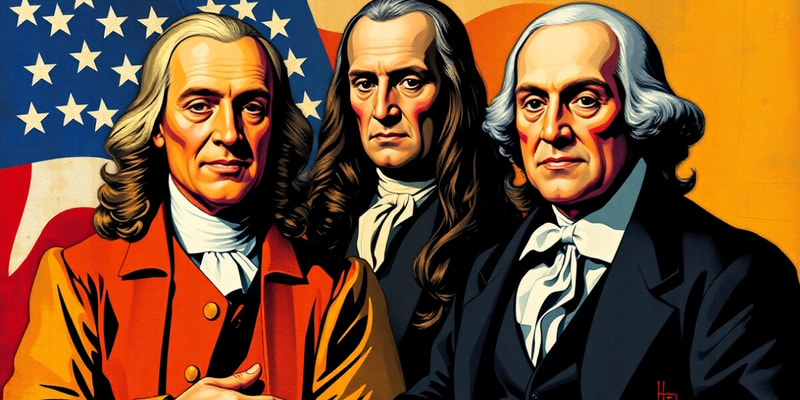Podcast
Questions and Answers
What does the phrase 'To each his own' signify in the context of American justice?
What does the phrase 'To each his own' signify in the context of American justice?
According to the framers of the Constitution, which of the following is NOT a duty of the just state?
According to the framers of the Constitution, which of the following is NOT a duty of the just state?
What aspect of equality do the American statesmen advocate concerning legal matters?
What aspect of equality do the American statesmen advocate concerning legal matters?
Which right is emphasized for the poor man in the context of a just state?
Which right is emphasized for the poor man in the context of a just state?
Signup and view all the answers
What distinguishes the American approach to justice from that in many European states historically?
What distinguishes the American approach to justice from that in many European states historically?
Signup and view all the answers
Study Notes
American Founders' Beliefs on Equality
- The American revolutionaries believed in justice through individual expression, as long as it respects others' rights and contentment. They believed every man has the right to pursue their own abilities and inheritances from their forefathers.
- The just state, in their view, ensures protection for all, including the energetic, contemplative, propertied, poor, religious, and craftsman. Justice is a system of impartial adjudication to protect individual rights and interests.
- American statesmen believed men differ in character, talents, and needs. The founders aimed for equal justice under the law but not artificial equality in social standing. They rejected uniformity, recognizing that men are inherently unequal in skills and wealth.
- Equality meant equal treatment under the law: no exemption from justice based on social status. No one is naturally privileged from the operation of just laws. The founders sought to ensure that every man could keep what is rightfully his, within the framework of just laws.
Order and Class
- They believed that order is essential for a civilized society, impliying the need to recognize different functions and abilities among members of society.
- The Founders recognized the need for leaders but believed that not all men are capable of leadership. They aimed to shape a system where leaders would be chosen wisely, with their power checked by constitutions and countervailing forces.
- They were opposed to a "classless society.". They saw the existence of classes, like fishermen, farmers, merchants, and clergy, as natural and inevitable.
- They did not reject "natural aristocracy," viewing it as leadership by those with unusual talents and resources. The Founders believed leadership needed to be qualified, based on intelligence, charm, strength, industry, wealth, family, education, etc., to influence others.
- They rejected hereditary privileges and caste systems.
- The Founders advocated for a mixture of aristocracy and democracy, balancing the power of wealth and individual talent with the will of the people. They designed a system to safeguard against both the power of the wealthy and the tyranny of the majority.
Balancing Interests
- They were neither pure aristocrats nor pure democrats, as they believed a society should be a blend of both.
- To achieve this balance, they incorporated safeguards against the misuse of power by the strong or the needy. They recognized that some individuals, regardless of social standing, would abuse power.
- The founders aimed to create a system of constitutional laws that would protect social order from the authoritarian, or the mob. This would balance the interests and authority of various classes and interests within the state and nation.
- They understood that order is essential for a functioning society and believed that balancing various interests was key to maintaining that order.
Studying That Suits You
Use AI to generate personalized quizzes and flashcards to suit your learning preferences.
Related Documents
Description
Explore the beliefs of American revolutionaries regarding justice and equality. This quiz delves into their views on individual rights, the role of government, and the importance of equal treatment under the law. Test your understanding of the foundational principles that shaped America.




